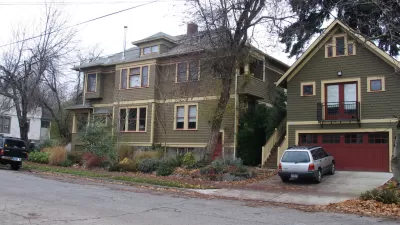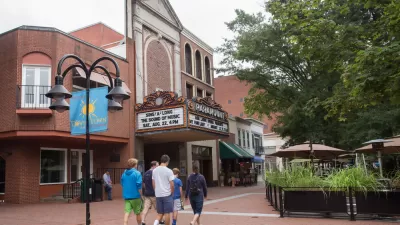Reform of the Washington State Environmental Policy Act (SEPA) is underway at the local level after a new state bill offered "safe harbor" under the law for a menu of land use and development reforms.

Natalie Bicknell reports on the local response in Seattle to the passage of House Bill 1923, state level legislation passed earlier this year that "provides cities with a menu of options for increasing their housing density and then provides 'safe harbor,' or protections from SEPA lawsuits, for actions taken from that menu."
In response to the breathing room provided by the new state law, Seattle councilmembers Mike O'Brien and Abel Pacheco have introduced Council Bill 119600, "which would align Seattle’s environmental review process with recent changes state level changes made to SEPA," according to Bicknell.
Bicknell lists some of the important changes proposed by Council Bill 119600:
- Align City code with new state law House Bill 1923 that exempts some City Land Use Code changes from SEPA appeals;
- Limit Hearing Examiner SEPA appeal hearings to 120 days, with an option to extend to 150 days if all parties agree;
- Clarify that additional and voluntary subjects covered in an Environmental Impact Statement are not subject to appeal;
- Update SEPA thresholds for Urban Villages to exempt projects with less than 200 units and 12,000 square feet; and
- Allow the Seattle Department of Construction and Inspections to create a SEPA Handbook that provides guidelines for consistent analysis.
Bicknell speculates that the bill is likely to pass by October, which is when "things will really become interesting."
An article by Dan Bertolet, published in November 2017, details the obstructionist effect of SEPA.
FULL STORY: Seattle Advances SEPA Reform with Equity and Affordability in Mind

Planetizen Federal Action Tracker
A weekly monitor of how Trump’s orders and actions are impacting planners and planning in America.

Maui's Vacation Rental Debate Turns Ugly
Verbal attacks, misinformation campaigns and fistfights plague a high-stakes debate to convert thousands of vacation rentals into long-term housing.

Restaurant Patios Were a Pandemic Win — Why Were They so Hard to Keep?
Social distancing requirements and changes in travel patterns prompted cities to pilot new uses for street and sidewalk space. Then it got complicated.

In California Battle of Housing vs. Environment, Housing Just Won
A new state law significantly limits the power of CEQA, an environmental review law that served as a powerful tool for blocking new development.

Boulder Eliminates Parking Minimums Citywide
Officials estimate the cost of building a single underground parking space at up to $100,000.

Orange County, Florida Adopts Largest US “Sprawl Repair” Code
The ‘Orange Code’ seeks to rectify decades of sprawl-inducing, car-oriented development.
Urban Design for Planners 1: Software Tools
This six-course series explores essential urban design concepts using open source software and equips planners with the tools they need to participate fully in the urban design process.
Planning for Universal Design
Learn the tools for implementing Universal Design in planning regulations.
Heyer Gruel & Associates PA
JM Goldson LLC
Custer County Colorado
City of Camden Redevelopment Agency
City of Astoria
Transportation Research & Education Center (TREC) at Portland State University
Jefferson Parish Government
Camden Redevelopment Agency
City of Claremont





























